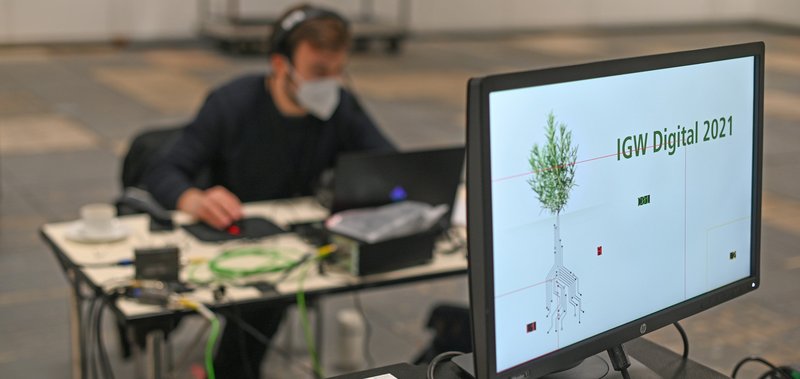News
Genetic Engineering at the International Green Week 2021
At least two online meetings were devoted explicitly and exclusively to genetic engineering: The ‘Genome Editing Dialogue’ as part of the Global Forum for Food and Agriculture (GFFA) and the event entitled ‘Agricultural Ecology instead of Genetic Engineering – How does the world feed itself?’ sponsored by the Green Party. And even at the IGW’s agricultural policy kick-off by the Deutscher Bauernverband (DBV) [German Farmers’ Association], genetic engineering was on the agenda.
Dishonest link between the Corona vaccine and genetically engineered plants
It is noteworthy how supporters of genetic engineering have been increasingly aggressive in their attempts to create a dishonest connection between the Corona vaccine debate and the use of genetic engineering in agriculture, even though the two issues have little to do with one another. The strategy appears to be an attempt to transfer the positive image of vaccines that are produced with genome editing, to agricultural applications. As a result, anyone who is critical of genetically engineered plants is painted as opposing medical achievements. The core difference – that in medicine genetic engineering applications occur in closed systems, while in agriculture genetic engineering involves releases into the ecosystem – is deliberately concealed by the promoters of genetic engineering.
Political discussion of genetic engineering at the Bauernverband (DBV)
Christian Lindner, Chairman of the German Liberal Party FDP, for example, made this connection at the DBV panel debate and it was also raised at the GFFA debate on new genetic engineering. Lindner demanded that new genetic engineering ‘should not face the same regulatory hurdles’ as the old.
Agricultural politician Gitta Connemann, of the German Conservatives CDU, too, stressed that her party is ‘known to be very open to the new cultivation technologies’ and indicated that she was pleased with the presumed indications of more openness to genetic engineering on the part of the SPD and the Greens, which she nevertheless believes is still ‘too non-specific’.
Green Party Chairman Robert Habeck, on the other hand, spoke of ‘justified scepticism’ and demanded strict regulation of the use of new genetic engineering within the meaning of the 2018 ruling by the European Court of Justice (ECJ).
The Parliamentary Speaker of the Left Party, Dietmar Bartsch, also expressed ‘a great deal of continued scepticism’ towards the promises of genetic engineering on combating world hunger.
SPD environmental politician Matthias Miersch spoke of ‘hard-core interests’ backing new genetic engineering and warned of oligopolization and the interlinking of law, patents and proprietary rights to plant varieties.
The panels of the events run by the GFFA and the Greens were occupied, respectively, by proponents and critics of genetic engineering, so that no controversial discussions were held and there were few surprises in terms of content.
‘Genome Editing Dialog’ attempts to win over Greta Thunberg
At the ‘Genome Editing Dialog’, there was an attempt, similar to that made by the FDP at the DBV, to stress the Corona vaccine connection. Another of the new arguments by the proponents of genetic engineering was presented by, among others, CDU politician Norbert Lins, Chairman of the Agriculture Committee in the European Parliament. He even tried repeatedly to claim Greta Thunberg’s support for genetic engineering, with climate protection and ‘Listen to the science’ arguments. What would she think of that, he wondered? The GFFA presenters warned of ‘serious disruptions’ in global agricultural trade if the EU deregulates new genetic engineering.
Feeding the world with agricultural ecology instead of genetic engineering
Under the heading ‘Agricultural Ecology instead of Genetic Engineering – How does the world feed itself?’ the Greens’ agricultural politician Harald Ebner, along with the experts Christine von Weizsäcker (President of Ecoropa – European Network for Ecological Reflection and Action), Lena Bassermann (INKOTA Network) and Stig Tanzmann (Brot für die Welt) [Bread for the world] set out to counter the frequently made claim that genetic engineering could contribute to feeding the world, using concrete perspectives and approaches based on an agricultural ecology model that can ensure long-term, sustainable self-sufficiency worldwide.
2021 agricultural policy annual kick-off by the Deutscher Bauernverband
Future of agriculture: agricultural ecology instead of genetic engineering! (Green Party)
GFFA 2021: ‘Climate-proof food systems: the role played by new breeding techniques – globally and in Europe’
top agrar: EU genetic engineering regulation to cause upheavals in agricultural trade

